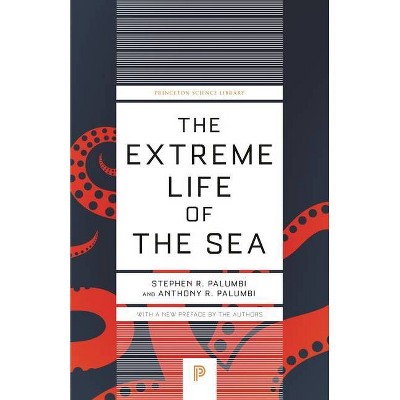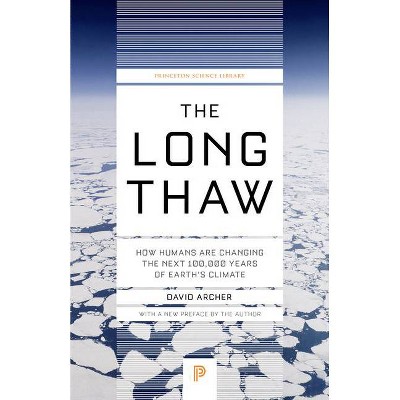The Extreme Life of the Sea - (Princeton Science Library) by Anthony R Palumbi & Stephen R Palumbi (Paperback)

Similar Products
Products of same category from the store
AllProduct info
<p/><br></br><p><b> Book Synopsis </b></p></br></br><p><b>A thrilling tour of the sea's most extreme species, coauthored by one of the world's leading marine scientists</b> <p/>The ocean teems with life that thrives under difficult situations in unusual environments. <i>The Extreme Life of the Sea</i> takes readers to the absolute limits of the ocean world--the fastest and deepest, the hottest and oldest creatures of the oceans. It dives into the icy Arctic and boiling hydrothermal vents--and exposes the eternal darkness of the deepest undersea trenches--to show how marine life thrives against the odds. This thrilling book brings to life the sea's most extreme species, and tells their stories as characters in the drama of the oceans. Coauthored by Stephen Palumbi, one of today's leading marine scientists, <i>The Extreme Life of the Sea</i> tells the unforgettable tales of some of the most marvelous life forms on Earth, and the challenges they overcome to survive. Modern science and a fluid narrative style give every reader a deep look at the lives of these species. <p/><i>The Extreme Life of the Sea</i> shows you the world's oldest living species. It describes how flying fish strain to escape their predators, how predatory deep-sea fish use red searchlights only they can see to find and attack food, and how, at the end of her life, a mother octopus dedicates herself to raising her batch of young. This wide-ranging and highly accessible book also shows how ocean adaptations can inspire innovative commercial products--such as fan blades modeled on the flippers of humpback whales--and how future extremes created by human changes to the oceans might push some of these amazing species over the edge.</p><p/><br></br><p><b> Review Quotes </b></p></br></br><br><i>The Extreme Life of the Sea</i> is less narrative and more an enthusiastic sharing of cool things in the sea, which are loosely tied together in thematic sections. It is not, however, just a collection of 'gee whiz' facts. The compelling vignettes help to convey broader concepts of science and nature with excitement and enthusiasm. . . . It reminds us that science and the natural world are really cool.<b>---Josh Witten, <i>Finch and the Pea</i></b><br><br>[A] stimulating and enjoyable read.-- "Diver Magazine"<br><br>[B]eautifully descriptive and refreshingly free of technical terms. Here is a book that will be enjoyed by anyone with an interest in the biology of the seas, whatever their level of scientific education.<b>---Anthony O'Toole, <i>Sherkin Comment</i></b><br><br>[The Palumbis] have written about some of the most alien creatures you will ever encounter, and for many of them it is far more pleasant to encounter them on these pages than in real life. Yet as strange as they are, many of them are vital to keeping the oceans in balance, or as indicators of oceans out of balance, and so we ought to know them better. Brightly written, with footnotes but without ponderousness, the Palumbis' book succeeds in inspiring what they say they in their preface that they set out to produce: 'a sense of guiltless wonder about how wonderful the ocean's life actually is.'<b>---Rob Hardy, <i>Columbus Dispatch</i></b><br><br>A giddy scientific tour of weird underwater life.<b>---Richard Conniff, <i>TakePart</i></b><br><br>A rare hybrid: a funny and easy-to-read book full of accurate science.<b>---Susan Scott, <i>Honolulu Star-Advertiser</i></b><br><br>Drawing on decades of scientific research as well as a knack for storytelling, the authors convey what happens at the ocean depths without sugarcoating it. . . . It doesn't just shed light on some of the most mysterious workings of the sea; it does so with vivid prose while managing to convey scientists' current understanding of how and why these phenomena operate. If that doesn't make people more invested in preserving the ocean, it's hard to know what will.<b>---Juliet Eilperin, <i>Washington Post</i></b><br><br>Every page of this wonderful book is filled with nuggets of information. It becomes quite clear that we all must strive to protect this vast pool of life that enables our own lives to continue.-- "Explorers Journal"<br><br>Extremophiles are fun! Basically, they're the biggest, smallest, hardiest and definitely the oddest bunch of beasties to be found anywhere on this planet. The Palumbi father and son team--one scientist and one writer--bring us this fun little book on the extremophiles of the sea. . . . The best part of the book is that the authors do more than just recite oddball trivia, they really tell the stories of the animals in the book. . . . This is a solid book, very informative and very entertaining but with a strong message.<b>---John Dupuis, <i>Confessions of a Science Librarian</i></b><br><br>From 'immortal' jellyfish that age in reverse, to zombie bone worms that eat the skeletons of dead whales, the ocean is full of bizarre characters. Biologist Stephen Palumbi and his science writer son, Anthony, profile the most unusual specimens. Chapters cover the smallest, the oldest, the hottest and the coldest species, among others, and the landscape of strange creatures is brought to life by charming writing.<b>---Clara Moskowitz, <i>Scientific American</i></b><br><br>Highlighting the strangest cases in animate sea life, marine ecologist S.R. Palumbi exudes a palpable and contagious sense of delight as he enlists his writer son's help to fill the 'gap in character development' in the story of the ocean's robust yet fragile ecosystems. . . . By showing how each creature is so tightly tied to its environment, the authors are able to effectively demonstrate how small human-driven changes to the oceans disrupt a complex system developed over millions of years. The Palumbis encourage a childlike curiosity by showing us the amazing diversity of life down below, and perhaps our inner children will pester our grownup selves into doing what needs to be done to keep these habitats intact.-- "Publishers Weekly"<br><br>Highlighting the strangest cases of marine life, the authors give us a hint of the ocean's robust yet fragile ecosystems. . . . In their delightful, vivid description about the struggle for existence in the sea, the Palumbis do manage to communicate a vital message: even the extreme conditions in the deep sea are not immune from disruptive and destructive human greed.<b>---Wan Lixin, <i>Shanghai Daily</i></b><br><br>Incredibly accessible and frankly a joy to read. . . . It is refreshing to see writing that is trying, successfully, to convey challenging biological concepts with fun and humour. . . . It is a great and enjoyable book that will inspire readers and leave them with an incredible sense of appreciation of the natural world.<b>---Dr. Alan Jamieson, <i>Underwater Technology</i></b><br><br>Marine biologists as well as lay readers with more than a casual interest in marine science will find this an engrossing discussion of what lies beneath the waters, how it's adapted, and threats to this adaptation process.<b>---James A. Cox, <i>California Bookwatch</i></b><br><br>One of the most informative books I've ever read.<b>---Al Ristori, <i>Newark Star-Ledger</i></b><br><br>Only the strong survive, it is said, but <i>The Extreme Life of the Sea</i> makes a good case for the strange, the efficient, and the ugly. . . . [A]n engaging blend. Stanford professor Stephen serves up the heavier science of DNA and physiology, seasoned with a sprightly narrative, some scene-setting and humor from novelist Anthony. <i>Extreme Life</i> uses Guinness Record-like chapters to discuss the smallest, the deepest, the shallowest and the coldest marine life-forms.<b>---Melissa Davis, <i>Seattle Times</i></b><br><br>Simply a tour de force, a splendid must read for any natural history enthusiast.<b>---Gabriel Thoumi, <i>Mongabay.com</i></b><br><br>Stephen and Anthony Palumbi--father and son; biologist and science writer--are brilliant guides to this realm about which we as a species have been remarkably incurious. . . . The Palumbis père et fils give us the new stories in succinct prose beautifully freighted with apt similes and metaphors.<b>---Peter Forbes, <i>Independent</i></b><br><br>Steve Palumbi has got a gift for summarizing complicated issues related to his field, making them both relatable and entertaining. . . . <i>The Extreme Life of the Sea</i> plunges readers into the world of 'the fastest and deepest, the hottest and oldest creatures of the oceans.'. . . At the heart of the book, though, the Palumbis stress how marine creatures have managed to adapt and thrive in some of the most punishing environments imaginable. Obviously, there's plenty we can learn from them.<b>---Crystal Chow, <i>San Jose Mercury News</i></b><br><br>The book reads like an action-adventure novel. . . . This approach is a pleasant departure from dull textbook prose. It will delight readers who lack scientific credentials but yearn to understand the diversity of life in the oceans. The text demystifies, mystifies, and amazes.<b>---Geraldine Richards, <i>ForeWord Reviews</i></b><br><br>The chapters are informative and interesting and altogether well written.<b>---Tom Fenchel, <i>Marine Biology Research</i></b><br><br>The uniqueness of this book is due to the combination of a novel's flair utilizing figurative language and analogies with scientific concepts. . . . The authors seek to help us understand the value, complexity, and vastness of the ocean and the importance of consequences of their actions. I think that this would be an excellent book in a seminar for high school students and biology majors in college.<b>---Jean Worsley, <i>NSTA Recommends</i></b><br><br>The whole safari is conducted with a verve and joy that only comes from a deep love of the subject, a life-long dedication to its exploration and a true communicator's sense of the <i>mot juste</i>. This experience and range means the Palumbis can write comfortably about research and researchers, and about the physical and mental exploration of the ocean's ecology. . . . [A] splendid book . . . a dynamic text.<b>---Adrian Barnett, <i>New Scientist</i></b><br><br>The Palumbis give us the sense that although some parts of nature are more romantically wondrous than others--those sponges, giant squids doing epic battle with sperm whales--it is the variety that is wonderful.<b>---Owen Richardson, <i>Sydney Morning Herald</i></b><br><br>The Palumbis probe life in the depths of the oceans and in tide waters in successive chapters spotlighting the long-lived Bowhead whale; sea species that adapt to extremely high temperatures and others to cold; clownfish, which change gender, becoming male or female as circumstances dictate; and much more. The authors end with a warning that the oceans contain a complex ecology in which each species 'thrives in its easily disrupted specialized niche.'. . . A sparkling appreciation of the wonderful variety of marine life that also communicates an important message.-- "Kirkus Reviews"<br><br>This book about sea creatures is perfect for the curious person with limited time for reading. . . . [T]he authors investigate all sorts of oddities, including whale falls, the bizarre sex life of angler fish, and the amazing aerodynamic design of humpback whale fins. They have conducted research in all sorts of odd corners of marine science and are wonderfully up-to-date, and end their text the necessary final chapter on how humans might be affecting all this diversity.-- "Choice"<br><br>This engaging book eloquently captures the long history and immense variety of life in the world's oceans, and provides a glimpse into what makes the seas so special. . . . Better than science fiction, this book is filled with amazing stories about amazing creatures. . . . Sweetly enthusiastic, enlightening and witty and, at times, inspired. . . . Regardless of your level of knowledge, this quietly joyful and informative book has something of value for everyone.-- "GrrlScientist"<br><br>This gem of a book by marine biologist Stephen Palumbi and his son, science writer Anthony Palumbi, finds enough weirdness in the ocean to feed creativity for generations to come. . . . The Palumbis' writing is a wonderful mix of meticulous science and creative panache. . . . A joy whether read at one sitting, or dipped in and out of to prolong the pleasure.<b>---Callum Roberts, <i>Nature</i></b><br><br>This is a scientifically rich book that is also a good read and would be appropriate for a wide range of audiences.-- "AAAS"<br><br>While packed with scientific information, this book is an easy read. The average chapter is just over ten pages long, and each is divided into clearly labeled subsections. It is fairly generously illustrated and written in a light, conversational style--as seen by the references to Volkswagen Beetles and the population of India. These characteristics make this an easy book to dip into, but once you get started, you'll probably want to immerse yourself.<b>---Tom Baker, <i>Japan News</i></b><br><br>Who doesn't like reading about the fantastical creatures that stalk the inky depths of the world's oceans? In <i>The Extreme Life of the Sea</i>, it's the marine environment's superlatives that are on display.-- "Scientist Magazine"<br><p/><br></br><p><b> About the Author </b></p></br></br><b>Stephen R. Palumbi</b> is Professor of Biology at Stanford University. <b>Anthony R. Palumbi</b>, Stephen's son, is a science writer and novelist whose work has appeared in the <i>Atlantic</i> and other publications.
Price History
Cheapest price in the interval: 17.99 on October 27, 2021
Most expensive price in the interval: 17.99 on December 20, 2021
Price Archive shows prices from various stores, lets you see history and find the cheapest. There is no actual sale on the website. For all support, inquiry and suggestion messagescommunication@pricearchive.us




















